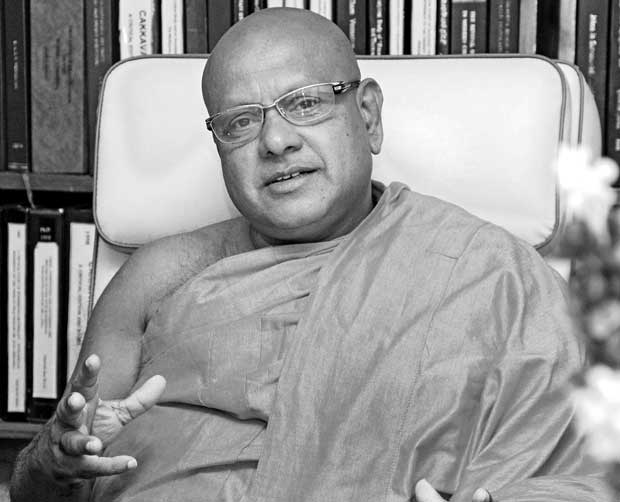Reply To:
Name - Reply Comment
Last Updated : 2024-04-25 06:31:00

 he government stated that the Bill was brought forth in order to address several issues observed within the Sangha community and following persistent requests of chief prelates of the Theravadi Bhikku Chapters in the island.
he government stated that the Bill was brought forth in order to address several issues observed within the Sangha community and following persistent requests of chief prelates of the Theravadi Bhikku Chapters in the island.
Controversy due to unfamiliarity
In a discussion with the Daily Mirror, Director of the Postgraduate Institute of Pali and Buddhist Studies, Kelaniya University and the Anunayake Thera of the Kotte Chapter Ven. Kotapitiye Rahula Thera said that the Bill was a result of several concerns raised by a number of chief priests of Sangha Moolasthana or Chapters. According to Rahula Ther, prior to the tabling of the Bill, the chief prelates had arrived at a settlement that the Kathikawath or the consensus reached by the Bhikku community must be reinforced within a legal framework. He added that this dialogue has  been a persistent issue for over the past 30 to 40 years.
been a persistent issue for over the past 30 to 40 years.
“I personally believe that in the past the government’s attempt to legalise the Bhikku Kathikawatha was perceived with negative connotations that did not necessarily portray the objective of the Bill’s registration. This of course can be attributed to the lack of awareness among the public but we cannot blame the public or the Sangha in this matter” the prelate said.
The Bhikku Kathikawath (Registration) Bill could also be perceived as an attempt to create dialogue among Buddhist monks in the country. “There is a common consensus within the three Nikayas of the Sangha; the Siam, Amarapura and Ramanna Chapters. There are pre-existing norms and traditions upheld by each Nikaya. These differ from chapter to chapter. As per my, knowledge all Bikkhu chapters in the country except the Asgiri and Malwathu Chapters, have already formulated their own Kathikawath by which they abide. For instance, the Kotte chapter formulated the Kathikawatha 10 years ago. The proposed Bill is intended to bring the Kathikawath in each Sangha Moolasthana into effect and to give it legal authority. The general public and the Sangha community are unaware of this. They thought that the Bill would impose a ‘one size fits all’ set of principles and a code of conduct. They thought the Bikkhus would be restricted and questioned the government’s ability to enforce such restrictions.” The Thera explained.
Who should formulate Kathikawath - Monks or Politicians?
Ven. Rahula Thera is of the view that the Kathikawath must be formulated by the monks of each Nikaya, themselves. Chronicles narrate that certain particulars were agreed upon in order to moderate the conduct of monks during the Polonnaruwa period with the Polonnaruwa Kathikawatha. The Dambadeni Kathikawatha, also attempted to do the same. In both instances the Kathikawath formulated by the monks were accepted by the ruler of the time. “The code of conduct must be enforced by the Sangha themselves. This was what happened in ancient times as well. The Nissankamalla Kathikawatha during the Polonnaruwa period for instance was formulated by the monks and presented to King Nissankamalla. Kathikwatha means a consensus arrived at following a discussion. A Kathikwatha includes matters such as the manner in which the robe is worn,
permission to practise medicine etc. The intention of this government was also to give legal backing to this code of conduct as done in ancient times” The Anunayaka Thera of the Kotte Chapter said.
The proposed Bill details five factors that will not be permitted under the Kathikawath:-
Controversial terms
According to Ven. Rahula Thera, the use of the word ‘occult’ in the Bill was a kick in the hornet’s nest. “Monks thought that the Bill was sent to control the Sangha community and its activities. In the Sinhala text of this Bill, it states that monks will be prohibited from engaging in “guptha” (occult) practices. This can be interpreted in various ways. Most practices of our religion such as the chanting of pirith is in fact occult, which refers to the knowledge of the paranormal. Monks began to interpret that this term was used to restrict them from chanting pirith and performing other religious duties” the Venerable Thera said. According to him, this clause can be used against someone in the event of a conflict where legal measures can also be enforced, even if it’s a simple instance of a pirith chanting ceremony at a house or conducting a bodhi pooja.
The Bill has also disallowed monks engaging in medical practices. However, the practising of medicine has been an ancient tradition of Buddhist monks recorded in the thripitaka as well. Certain medical traditions have been practised by Buddhist monks since the time of the Buddha known as ‘Buddhist Ayurveda’. This practice does not acknowledge acceptance of money or actions that may result in a change that would lead to the questioning of the conduct of a monk. It is performed as a noble service to society. However, in recent times monks have been known to establish various medical practices where monetary gains were involved. According to government representatives, the term ‘occult’ has been included in the Bill with the intention of bringing an end to such practices.
Ven. Rahula Thera says that these specific segregates are not a requirement for this Bill tabled in Parliament. “The last time that we convened to discuss the Bill, we informed the subject Minister of this issue. We told him that each Sangha Moolasthana were able to segregate their own code of conduct, according to the Vinaya laws and practices of their respective Sangha Moolasthanaya. What should have been included in this was the fact that the common kathikawath agreed upon by all Sangha communities would be legally reinforced through criteria endorsed by this Act. What happened instead caused a great quandary where some even challenged the Bill in Court. If these segregates were removed from the Bill and presented to Parliament, it would have not faced such controversy. I suggested this to the officials but they chose to ignore this” the Thera charged.
“For example if there was a separate Court for Bhikkus, the judgment passed by this Court would be heard by a panel of Judges. It is included in this Bill that if an issue arises, there is a panel of Judges (monks) governed by a chief monk who will refer the matter to the Commissioner General of Buddhist Affairs. The Commissioner General will send this to the Attorney General who in turn sends this case to the Magistrate of the respective district. There is no flaw in this process. The flaw is that the Bill was presented in a manner that was not coherent to the public or the Bhikku community” the prelate said commenting on the provisions in the Bill for Bhikkus found violating the act.
Speaking on the issue of monks’ driving vehicles, Rahula Thera said that it is deemed as bringing disrespect to priests. “Those who are demanding that licence be granted for monks are not aware of the consequences it brings about. It will affect social and moral conduct and discipline of a monk, thereby breaching Vinaya (disciplinary) principles. This can affect the ‘parajika’ term referred in Buddhist discipline. The Buddha had recommended that in the event a monk’s conduct is questioned, the monk must be ready to accept allegations levelled against him. Therefore these activities, if allowed, will be detrimental to a monk’s discipline.”
Rahula Thera concedes that these recommendations cannot be implemented in the case of a foreign monk, where the cultural and situational context differs from ours. Therefore the Bill should have included the recommendation that monks should not be allowed to drive in Sri Lanka.
The code of conduct looks politicised
Highlighting another weakness of the Bill Rahula Thera noted that the Bill should specify the nature of businesses that monks would not be allowed to be involved with. “There are bookshops and other small publication houses in temples operated by monks. Their future will also be in jeopardy with this clause.”
He did not fail to note that a recommendation previously included in the Bill stated that monks should refrain from engaging in active politics and entering Parliament. “This recommendation was retracted upon influences of certain factions. This is a grave issue which harms the Buddha Sasana. No other country with Theravadi Buddhism has monks who enter politics and are members of Parliament” the prelate lamented.
He grieves for the state of the Bhikku community in the island adding that it is in grave need of discipline. He, when citing an example said that in the earlier days not all the monks were permitted to deliver sermons. It is common knowledge that monks delivering a sermon must be of some calibre and merit who are tasked with the responsibility of guiding laity on a spiritual path. Being one of the most recognized academics and Buddhist leaders in the island, Ven.Kotapitiye Rahula Thera holds office in the highest Buddhist Academic institute in the island. Yet, with over 30 years of experience in imparting knowledge as a University lecturer he has not been invited to deliver a single sermon by the State television since 1996, which signifies that even sermons are subject to viewer ratings and are not driven by content.
“The government is now attempting to Amend the Bill following the Supreme Court ruling that the Kathikawatha was in contravention to the Constitution. But it is clear that the government has no cohesive plan. If there is to be an Amendment it should be agreed upon by all parties concerned. But considering certain claims made by several leading monks, meetings to deliberate this issue did not include all monks. It is evident that there is no map for this discussion. This is the single greatest cause for the controversy surrounding the Bill. Every Buddhist monk and citizen should be made aware of this Bill. Nevertheless, the Buddha Sasana and politics cannot mingle. All this contention is because everything has been politicised’.
Need of the hour
It is evident from the comments of the distinguished prelate that the government lacks a consistent structure in implementing the Bhikku Kathikawath registration Act. Rahula Thera is of the opinion that if the Bill is to be enacted, it must be achieved in a systematic and organised manner. “A separate panel should be appointed so that they could deliberate the matter in detail. Furthermore, the Bhikku community must also arrive at a consensus as to what must be included in the Kathikawatha. Each code of conduct or Kathikawatha may differ but this must be discussed in detail and cannot be done overnight” Rahula Thera elaborated.
The discussion with the prelate paints a clear picture of the predicament the government is faced with over the Bhikku Kathikawath Bill. One could also argue that the dilemma is of the government’s own making as decisions over the Bill have obviously been influenced by politicians more than leaders of the Bhikku community. Yet, worldwide media attention thrown at Sri Lanka, every time a saffron clad monk is seen acting violently during the numerous protests that take the streets in the island, depict the urgent need of a code of conduct for all monks. Citizens are also growing weary of Buddhist movements taking social media by storm and of countless reports of various saffron-robed impersonators. As Ven. Kotapitiye Rahula Thera believes those who voice concerns of the Buddhist community are indispensable and yet these very figures are also in grave need of monitoring and constraint.
While some state that the Kathikawatha is a violation of freedom of thought and religion, it has also been argued that converting every violation of a decision of the Karaka Sangha Sabha of a Chapter into an criminal offence, is a violation of Equality before the Law. Whatever disputes take place it is necessary for the Bhikku Chapters to come to an accord over the debate and for the government to facilitate dialogue where all representatives are given equal opportunity to participate in. The Buddha was known to have imposed the Vinaya rules and regulations heeding to contemporary public opinion.
The physical, environmental, political, geographical, scientific and technological context that the decrees set in the time of the Buddha are very different to those of the 21st century. Dhamma will reign immortal; however, monks who are thrust with a mission to propel the eternal philosophy must reach an accord as to how they can serve and function in society practically.
Pix by Damith Wickramasinghe

Add comment
Comments will be edited (grammar, spelling and slang) and authorized at the discretion of Daily Mirror online. The website also has the right not to publish selected comments.
Reply To:
Name - Reply Comment
US authorities are currently reviewing the manifest of every cargo aboard MV
On March 26, a couple arriving from Thailand was arrested with 88 live animal
According to villagers from Naula-Moragolla out of 105 families 80 can afford
Is the situation in Sri Lanka so grim that locals harbour hope that they coul